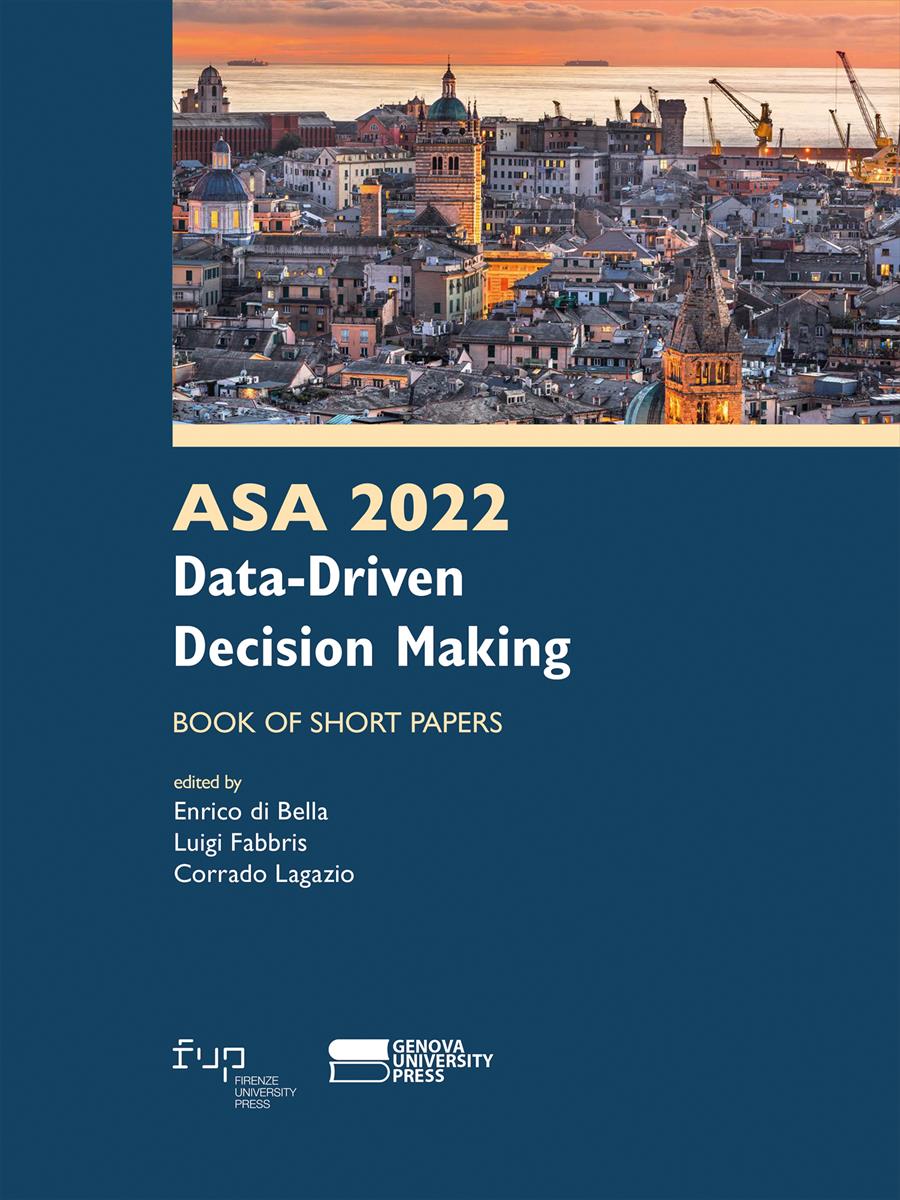- ASA 2022 Data-Driven Decision Making
- A cura di Enrico di Bella, Luigi Fabbris, Corrado Lagazio
The territorialisation of the 2030 Agenda: a multilevel approach
- Raffaele Attanasio
- Manlio Calzaroni
- Alessandro Ciancio
- Federico Olivieri
- Giovanni Siciliano
- © 2023 Author(s) |
- CC BY 4.0
- DOI: 10.36253/979-12-215-0106-3.16
The United Nations 2030 Agenda increasingly represents a reference point for political planning, as demonstrated by the centrality of the Sustainable Development Goals (SDGs) in the new cycle of EU policies. According to the European Committee of the Regions, 65% of the Agenda’s objectives will not be achieved without the involvement and coordination of subnational governments. It is therefore necessary for the territories to adapt their programmatic tools in order to make them coherent with European and national programming, through the definition of a methodology capable of conforming the tools of local programming with those defined at the higher territorial levels. The aim of this paper is to present the methodological framework defined by the Italian Alliance for Sustainable Development (ASviS), based on the numerous experiences with local administrations, to support the implementation of multilevel sustainable local development strategies which make territorial planning consistent with the national and the European programming. The basis for correct multilevel programming provides for a mapping of the local context with respect to the 17 SDGs also through the calculation of composite indices, capable not only of summarizing the degree of sustainability of the individual territories for each Goal, but also of comparing the performance between the different realities belonging to higher or lower levels. Based on these results, the public and private stakeholders are involved in identifying quantitative “outcome” objectives, needed to define the commitments of the territories and to monitor the impact of policies with respect to the achievement of the SDGs.
- Keywords:
- Agenda 2030,
- Multilevel system,
- Monitoring system,
- Composite indicators,
- Sustainable development,
- Stakeholder engagement,
ASviS - Alleanza per lo Sviluppo Sostenibile, Italy
ASviS - Alleanza per lo Sviluppo Sostenibile, Italy - ORCID: 0000-0003-1262-7815
ASviS - Alleanza per lo Sviluppo Sostenibile, Italy
ASviS - Alleanza per lo Sviluppo Sostenibile, Italy - ORCID: 0000-0002-2049-7283
ASviS - Alleanza per lo Sviluppo Sostenibile, Italy - ORCID: 0000-0003-3657-587X
- Better Policies for 2030 An OECD Action Plan on the Sustainable Development Goals. (n.d.). http://oe.cd/sdg
- Böhringer, C., & Jochem, P. E. P. (2007). Measuring the immeasurable — A survey of sustainability indices. Ecological Economics, 63(1), 1–8. DOI: 10.1016/j.ecolecon.2007.03.008
- Commission for Economic Policy. (n.d.). DOI: 10.2863/11396
- Comune di Parma. (2020). 2021-2023 DUP Parma.
- Decade of Action - United Nations Sustainable Development. (n.d.). Retrieved July 15, 2022, from https://www.un.org/sustainabledevelopment/decade-of-action/
- Emilia Romagna. (2020). We build the future together REGIONAL STRATEGY “2030 AGENDA FOR SUSTAINABLE DEVELOPMENT.”
- European Commission. (2016). Next steps for a sustainable European future European action for sustainability.
- European Commission. (2019). COMMUNICATION FROM THE COMMISSION TO THE EUROPEAN PARLIAMENT, THE EUROPEAN COUNCIL, THE COUNCIL, THE EUROPEAN ECONOMIC AND SOCIAL COMMITTEE AND THE COMMITTEE OF THE REGIONS The European Green Deal. https://eur-lex.europa.eu/re
- EUROSTAT. (2021). Assessment of indicator trends Assessment of indicator trends How are trends assessed? How are the assessment results presented?
- Gan, X., Fernandez, I. C., Guo, J., Wilson, M., Zhao, Y., Zhou, B., & Wu, J. (2017). When to use what: Methods for weighting and aggregating sustainability indicators. Ecological Indicators, 81, 491–502. DOI: 10.1016/J.ECOLIND.2017.05.068
- I numeri della sostenibilità - Alleanza Italiana per lo Sviluppo Sostenibile. (n.d.). Retrieved November 20, 2022, from https://asvis.it/I-numeri-della-sostenibilita/
- Mazziotta, M., & Pareto, A. (2015). Comparing Two Non-Compensatory Composite Indices to Measure Changes over Time: a Case Study.
- Mazziotta, M., & Pareto, A. (2018). Measuring Well-Being Over Time: The Adjusted Mazziotta-Pareto Index Versus Other Non-compensatory Indices. Social Indicators Research, 136. DOI: 10.1007/s11205-017-1577-5
- Nardo, M., Saisana, M., Saltelli, A., & Tarantola, S. (2005). Tools for Composite Indicators Building. http://europa.eu.int
- Nations, U. (2015). 70/1. Transforming our world: the 2030 Agenda for Sustainable Development Transforming our world: the 2030 Agenda for Sustainable Development Preamble.
- Remarks to High-Level Political Forum on Sustainable Development | United Nations Secretary-General. (n.d.). Retrieved July 15, 2022, from https://www.un.org/sg/en/content/sg/speeches/2019-09-24/remarks-high-level-political-sustainable-development-forum
- Sachs, J. D. (2015). The Age of Sustainable Development. Columbia University Press. DOI: 10.7312/sach17314
- Tarantola, S. (2016). State-of-the-art report on current methodologies and practices for composite indicator development. DOI: 10.13140/RG.2.1.1505.1762
Informazioni sul capitolo
Titolo del capitolo
The territorialisation of the 2030 Agenda: a multilevel approach
Autori
Raffaele Attanasio, Manlio Calzaroni, Alessandro Ciancio, Federico Olivieri, Giovanni Siciliano
Lingua
English
DOI
10.36253/979-12-215-0106-3.16
Opera sottoposta a peer review
Anno di pubblicazione
2023
Copyright
© 2023 Author(s)
Licenza d'uso
Licenza dei metadati
Informazioni bibliografiche
Titolo del libro
ASA 2022 Data-Driven Decision Making
Sottotitolo del libro
Book of short papers
Curatori
Enrico di Bella, Luigi Fabbris, Corrado Lagazio
Opera sottoposta a peer review
Anno di pubblicazione
2023
Copyright
© 2023 Author(s)
Licenza d'uso
Licenza dei metadati
Editore
Firenze University Press, Genova University Press
DOI
10.36253/979-12-215-0106-3
eISBN (pdf)
979-12-215-0106-3
eISBN (xml)
979-12-215-0107-0
Collana
Proceedings e report
ISSN della collana
2704-601X
e-ISSN della collana
2704-5846
